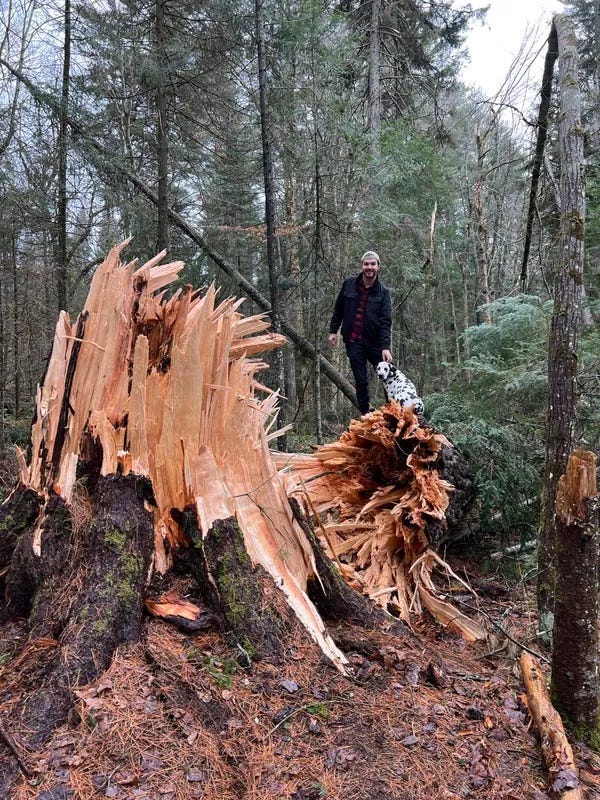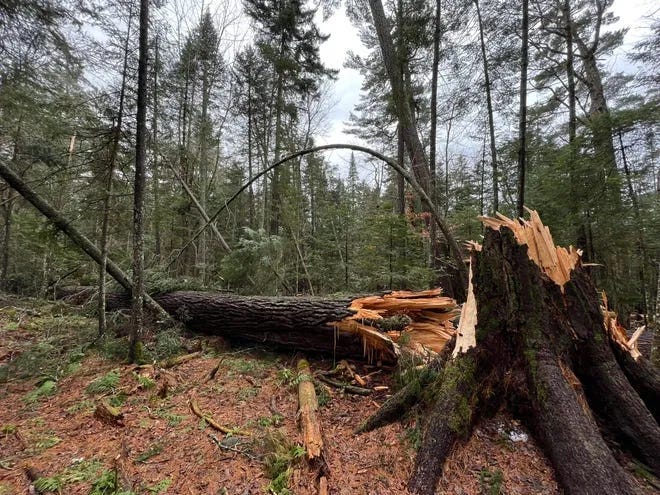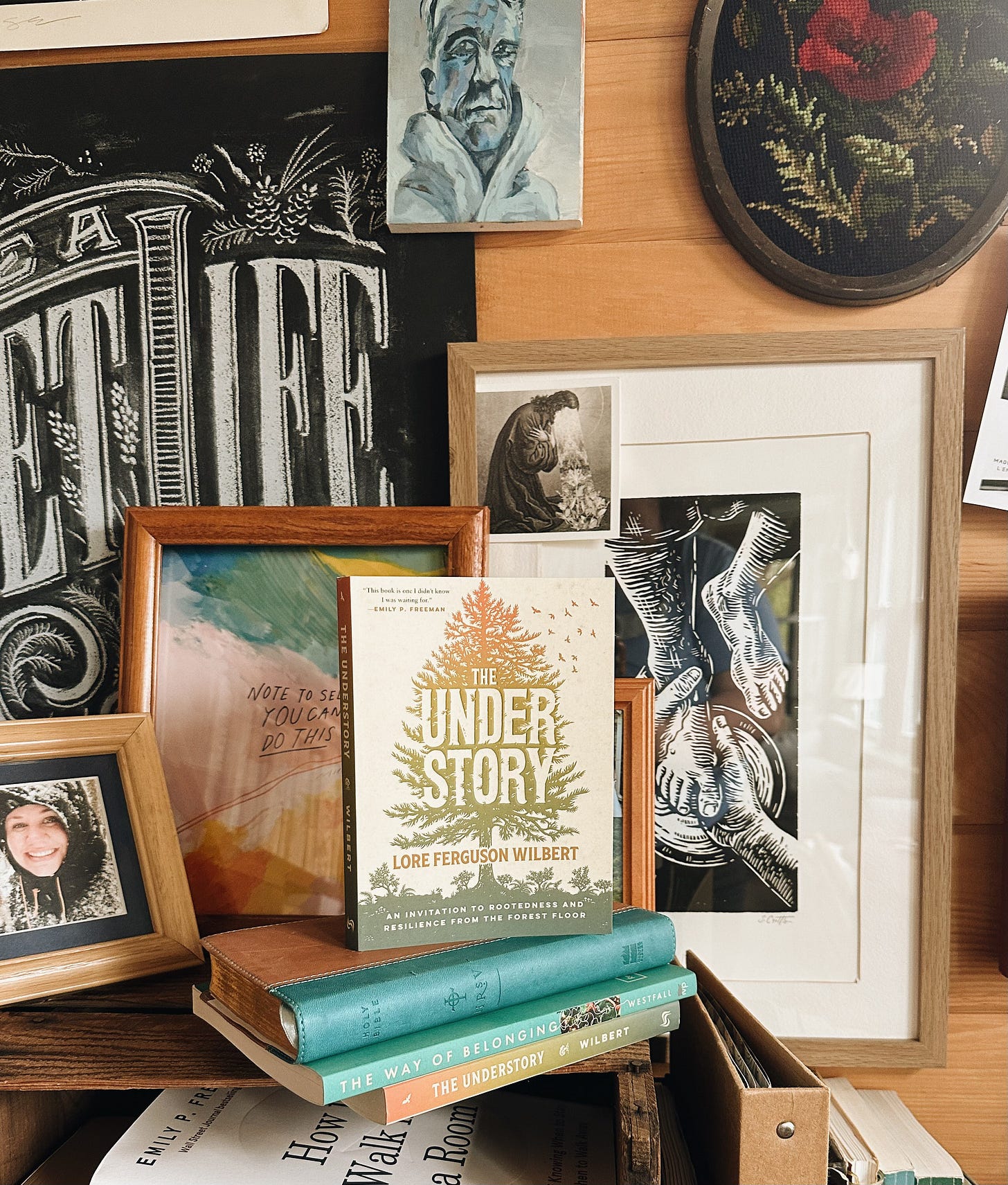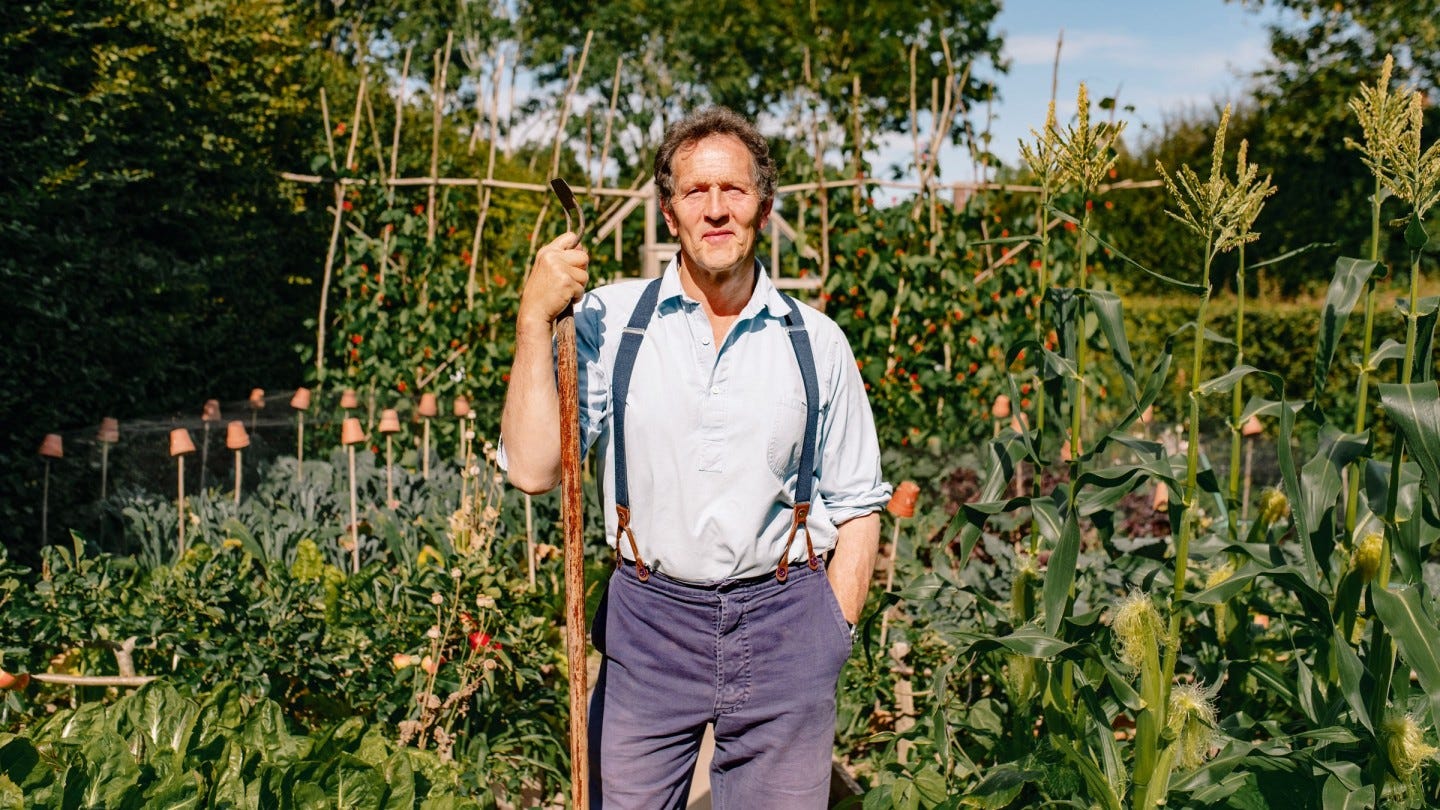the Empathy List #122: For Lore Ferguson Wilbert, Repentance Looks Like Changing Your Mind
Lore Ferguson Wilbert on Ecology, What the American Church Gets Wrong, and Generous Disagreement
Hello friend, Liz here.
I first crossed paths with Lore Wilbert at an Acts 29 church we both attended in Denver. As you might guess, we both had our own healing journeys to walk after that church encounter (you can hear about my walk in the dark), and Lore has contained her narrative of healing within this small, poetic work she’s just released into the world, The Understory: An Invitation to Rootedness Resilience From the Forest Floor.
Frankly, it’s a beautiful book, the type of book I love to read—part memoir, part nature/science/travel writing. And it filled me up the way literary green spaces usually do. She shares some shocking family stories, describes changing her mind and her followers and friends turning on her for it, and details the way that so many different griefs have continued to form her as a person.
While I realize that some of my readers may be temped to write Lore off as a conservative evangelical (because she has been represented that way in the past), actually, what I’ve found in these pages and in my personal friendship with Lore is a tender openness. She’s willing to be wrong, to explore nuance, to change her mind in public. In an age where so many thought leaders build their platforms on rigid ideologies, I find Lore to be thoughtful, wise, and humble. And I can jive with anyone who’s willing to admit that they have been wrong in the past and could be again (and probably sooner than later! Like me, I might add!).
So, I invite you to engage this conversation with my friend with the same kind of openness. Listen, learn, and stay humble. Let’s be curious and empathic together, winding our way toward Jesus at the very center.
Thanks for reading, my friends!
Warmly, Liz Charlotte Grant
Lore Ferguson Walker on Practicing Repentance by Changing Her Mind, the Healing Power of Nature, and Losing Friends and De-Influencing People ;-)


The Best-Kept Secret of New York is the Adirondacks
Liz: The Understory, your new book, is a coming home story.1 You and Nate move back to a formative place in the Adirondacks, where you spent many of your growing up years, and now you’ve returned at middle age. In braided essays, you’re reflecting on your past, examining what you believe and why you believe it, and alongside stories of your family and former churches, you weave throughout the metaphors of nature and ecology as a way of reckoning with the changes you see in yourself throughout the years. I noticed references to Bill McKibben, Wendell Berry, Terry Tempest Williams, Robin Wall-Kimmerer, and—my own personal tv crush—Monty Don from the BBC’s Gardener’s World. You also talk about elements of the forest floor like lichen, decomposition, and fungi. ;-) Can you talk to me about what nature has meant to you? Can you describe for me one of your very favorite outdoor places to visit?
Lore: First, can we just stop and love for a minute that you called them “braided essays?” I love that image so much and that’s exactly what they are. I also like that word because I learned so much from Robin Wall Kimmerer, who wrote Braiding Sweetgrass, and walks so many of the same forests I do in the Adirondacks. I loved her book.
Which brings me to my favorite outdoor place: the Adirondacks. They’re the best-kept secret of New York, which we usually envision as flashing lights and Times Square and entertainment. But up in the middle of the state, the largest track of protected land in the contiguous United States exists and has existed for more than a billion years. Something that I love about this area is that, despite erosion’s best attempts at wearing away at her, the Adirondack mountains are still growing.
However, despite my love for the mountain regions of the ADK, you’re more likely to find me on one of the 30,000 miles of rivers, lakes, and kayak-able waterways. One of the things I like about being on the water is that it brings me eye-level with the forest floor, which, as much as I like trees, I love the forest floor more.

Liz: What interests you about the forest floor, in particular?
Lore: There's so much death and decay. It's everywhere and it's so interesting. It happens at different speeds for different kinds of things and even the speed at which it decomposes leads to more air, space, and movement for all the other things around it to have their own process too. It also smells really good...generally ;) I'm really drawn to details and the forest floor offers so many details.
Changing Her Mind in Public
Liz: The structure of the book mirrored one metaphor you offered us based on a “field trip” you took as you were writing the book. Can you tell us about the visit to the nearby labyrinth? What is a labyrinth and what does it mean within the book? What does it mean to you now?
Lore: I picked the world’s worst time to visit a nearby labyrinth, late winter. As you read in the book, the labyrinth is covered over with snow when I get there and I almost have to invent my own path through her.
I considered giving up, but ultimately kept going because isn’t that what we’re all doing? Trying to find our way on ancient paths and sometimes finding them obscure or wanting or in need of restructuring?
I didn’t set out for an illustrative point, but I found one nonetheless. I’m still making my ways on ancient paths, trying to stay true to the Jesus who walked them first for us, but sometimes the paths are winding and confusing and obscured by the weather of whatever season our culture is in. Our work is to be always moving toward the center—who is Jesus.
Liz: For those unfamiliar with labyrinths, can you describe a bit about the history of labyrinths and how you move through one typically?
Lore: Of course! A labyrinth is often mistaken for a maze, however, unlike with a maze, there are no shortcuts or multiple ways of going. There is only one way, and it is around and around until you come to the center. Yet the path weaves in and out and back and forth around itself in a pattern that reveals that none of our journeys move in a linear fashion. No one knows exactly when the labyrinth was first used or why, though a labyrinthine image shows up in Greek mythology and on Grecian coins around 400 BC. A thousand years ago, the round Chartres labyrinth began being constructed on the floors of cathedrals and in gardens of the wealthy, the most famous inlaid on the floor of the Notre Dame Cathedral in Paris. Worshipers can walk the forty-foot-wide intricate pattern to the flower shape in the center, roughly 850 feet in length. Christians adopted the labyrinth as a sort of pilgrimage for those who could not make a journey to particular holy places. Pilgrims and parishioners could bring their cares and concerns, fears and anxieties to the labyrinth and practice giving them to the Lord while they walked.2
Liz: Much of the personal narrative in the book centers around you changing your mind—especially leaving behind some harmful and abusive theologies and relationships, and the grief and freedom that accompanies that process.
For example, you talk about complementarianism, the belief that men and women share “complementary” but patriarchal roles in the family and conservative church setting. I liked how you talked about that—that complementarian theology was “sticky.” It had its tendrils in every corner of you.
Can you describe what led you to that belief in the first place, what led you to change your mind, and how others from your past and present reacted to your change of mind? What other beliefs have shifted for you over time?
Lore: It’s funny that you say that because I don’t remember thinking or even writing about complementarianism. But I went back and looked, and I think what I was trying to get “unstuck” from was less certain theologies or ideologies, and more just inherited beliefs that I realized weren’t rooted (for me) in the Bible or the person of Jesus, but just the cultures I’d been a part of for my entire life. Before I felt like I had to always be choosing between this or that, and because “my people” (family, church, tribe, whatever) had chosen that, I just absorbed that it was right and good and what the Bible taught.
But I needed to do some systematic work with each of these beliefs, untangle the tendrils of each of them within my own heart and mind. I wasn’t even trying to get from this way of thinking to that way of thinking. I didn’t set out to “change my mind.” I set out to unstick myself from anything that was an inherited belief, whatever it was, and I’m still doing that work.

Losing Friends & Making Space for Disagreement
Lore: As for how people reacted and are still reacting [to me changing my mind], my husband once called what was happening “the changing of the guard” which made me laugh at first and then feel really sad. The truth is that I’ve lost a lot.
A lot of relationships couldn’t make that shift with me, a lot of readers couldn’t, and a lot of dear friends couldn’t. But the truth is also that some of them perceive themselves to have lost me. I’m the one they feel has left the scene, whereas I feel they left my scene. And a lot of the work that I’ve had to do and continue to do is— to continue the scene analogy—enlarge my perception of God’s stage.
God is telling a story, the most important story ever told, and God is telling it with all kinds of people in all kinds of spaces and in all areas of growth, maturity, ignorance, and more. We need the whole cast. So I’m working to not view those who’ve moved on from me as “lost” but instead we’ve just moved apart. We’re on different sides of the stage of God’s story.
Liz: That's a very generous take, allowing that God's stage is large enough to encompass an entire crowd of beliefs. What does that look like practically for you--when someone disagrees with you in private or public, how do you make space for their thoughts and opinions?
Lore: I usually ask a lot of questions, saying something like, "I can see this really matters to you, can you share why?" Or, "What in your life helped form this perspective for you?" Unless we're talking about something that I see as clearly morally right or wrong (which I recognize that line may fall in different places for different people for different issues), I think there's probably space for me to move toward them and perhaps space for them to move toward me. I would even consider it movement toward them if I grow in understanding their perspective. I don't think understanding a perspective has to mean I agree with it.

Is it possible to practice “freedom in Christ” on the internet?
Liz: I was struck by this idea you bring up about “freedom in Christ,” as in the freedom for disagreement amongst orthodox Christians, and how the internet has really flattened our capacity for nuance and hospitable disagreement.
You’ve been well known on the Christian internet for many years now—you wrote a popular blog, Sayable, and you’ve been on Instagram for a long time. So, I imagine changing your mind in public has been very challenging.
Would you describe some of the process of how and when you decided to share about your changing beliefs? Was any of the speaking up related to Trump’s election? What exactly caused you to “go public” about not identifying with the same tribes and camps as you had in the past?
Lore: I still write Sayable here on Substack, and it still feels like a really sacred space for me. I’m committed to changing my mind in public, and not just trashing whatever versions of me came before, but saying, “Here’s the whole of me, all of it, the whole story.” Anyone can go back and read the archives and see how I’ve changed and grown, said things I would never say now, and indeed, am probably saying things now I wouldn’t say in the future!
We’re often told in church that repentance literally means “changing your mind,” so I take that to mean, if I want to be in a constant state of growth and ongoing repentance, my mind is going to be constantly changing.
Why would I or should I be afraid of the public-ness of that? I think more of us should be changing our minds and saying it aloud when we do. What would our world look like if we all practiced that, like a spiral, drawing us nearer and near to the likeness of Christ?
Trump’s presidency wasn’t a catalyst for changing my mind. I’ve always been a sort of general skeptic about almost everything. But it was one of many watershed moments for me from 2014-2016, realizing that I’d been looking for approval, even love, from people who I now realized I really didn’t even know. Someone’s vote isn’t the whole of who they are, but how much they press others to agree with their vote and encourage them to vote like them, does say a lot about who they are. I realized I’d been putting my faith and trust in people that were oriented toward something that was diametrically opposed to what I wanted to be oriented toward.
Liz: That is insightful. You're saying, in other words, that the desire someone has to control someone else's mind and actions reveals more about their character than the particular action or belief they hold for themselves. Do they have space for another person to disagree with them? And why not?
I see all this tension around disagreement as directly related to the spate of narcissism amongst pastors and leaders in our churches. Can you think of an example of a Christian leader who surprised you with their openness to disagreement? How did Christ himself model this openness for us?
Lore: I think so, don't you? I believe in a pluralistic society. Diversity is necessary, we need tension in order to grow and also in order to die. I need people who believe differently than me in order to help me ground myself more deeply or see another side of God's image in them. But when we try to demand our way of being or believing on someone else, that hovers pretty close to abuse and I'm against abuse in all its forms.
Maybe this is totally cliche of me, but Eugene Peterson is an example of a Christian leader who was open to disagreement and challenge, so much so that he was still changing his mind about things on the precipice of his death. I admire that kind of continual growth. I also think Tim Keller, whether you agree with his theology or not, is an example of a Christian leader who didn't shy from disagreement or conflict. In fact, he invited it. Both of them modeled aspects of Christ's character in the ways they asked questions to get at the root of things—even asking them of their own selves when necessary.
What the American Church Gets Wrong About Church
Liz: We both have experiences with Acts 29 churches—and in particular, we shared one painful church experience, unfortunately—and I’m wondering, how would you describe your relationship with the church now? Have you found a way to “belong” to a church? What does/would that belonging look like?
Lore: Yeah, this is a hard one. I never, ever, not in a million years would have imagined I’d be where I am today in relation to the church. The truth is that I love the church but she and I are a bit at arm’s length these days. It could just be because of where I am geographically—eight of the top ten post-Christian cities in the US are within a few hours drive of us, it’s just not a very churched area, and the churches that are here tend to be pretty polarizing theologically and politically.
My husband and I disagree on a lot of theological things but one thing we’ve agreed upon is that we don’t want to be in a church that flies an American flag or a rainbow flag. It’s not because we are diametrically opposed to one flag or the other, but it is because a flag’s intention is to, literally flag something, wave allegiance to something or someone. Flying a flag says, “We’re about this” to the world, and we really, really, really just want to be about Jesus.
There are also metaphorical flags too, certain church networks, certain preacher names, and when those things are pretty central to a church’s identity, instead of an invitation to us, it reads as a red flag.
Our trust in the institutional church is really low. Our trust in Jesus is really high. Our love for the institution church is low. Our love for the people of God is high.
We’re still trying to figure out how we trust Jesus and love God’s people, and navigate whatever “church” is in 2024 (spoiler alert: I’m not sure what we think of as “church” is what the writers of scripture or God think of as church).
Liz: Oh, tell me more about that. How does the American Christian church get “church” wrong, philosophically and functionally?
Lore: How much time do we have? Let me just use an illustration a professor of mine used once. He told a story of this mural, this larger than life mural that's painted on the side of a Christian college campus building, a painting of generic white Jesus holding out a Bible, as though that was the whole purpose of Jesus' life, to give us the Bible. My professor said it should be the other way around, a painting of a Bible holding out Jesus. This is at the root of what I think the American Church gets really wrong. We build our lives around the Bible instead of building our lives around Jesus. The Bible shows us Jesus, yes, but it's not Jesus. And until we can get our worship in the right place, I think we're just going to be going sideways. Our compass is off by a degree and it's going to keep causing us to drift.
Healing from Grief
Liz: Grief is a major thread throughout the narrative, and that’s closely tied to familial trauma and complex PTSD. I know some of your story just because we’re friends, but I found the way that you told your family-of-origin’s story really enticing. Would you be willing to share some of that story?
Lore: I feel like more of that story will need to be a whole ‘nother book ;) The thing is, I love memoir, but I love memoir when it’s not “Look at me, the author, the hero of my own story amidst all these villains who raised me.” I think sometimes people want that kind of story because they want someone to hate and someone to love (we all do). But that’s not my story.
My family was and is complex, my dad is, the choices he made for our family and for himself were really harmful in hindsight, but he really thought (and still thinks) he was right: that the government is bad, people are coming to kill and destroy us, social security numbers are the mark of the beast, and I sold my soul to the devil the day I got one. Obviously there’s a lot more there, but I genuinely believe that he genuinely believes all those things and only wants to protect the ones he loves. I believe something different, a lot of things different, and my best personal growth has come by truly believing he was doing what he thought was right and also that he was objectively wrong. His actions harmed me and my siblings and my mother.
In chapter three I talk about truth, what is truth, who owns it. I write about competing truths or the complexity of truth, whose story is truly true, and more. I think our ability to hold competing truths together is so powerful and so good for our souls.
Liz: What practices have helped you to work through those experiences and to make sense of those relationships?
Lore: It helps me to say these things right out loud. Things like, "He thought he was doing good and he caused harm." It helps my brain grow more resilient to not make things so black and white. I am actually healing my brain when I can hold two disparate things together at the same time with peace. It might take a long time to get there, but I believe we can. Talking about things out loud with safe, attuned, calm, non-anxious people has helped me a lot too. When you grow up in a reactive home, you can become really sensitive to minor shifts in energy in conversations and my sensitivity to those shifts shut me down for a long time. I had to come to a place where I could thank God for my sensitivity because it protected me for a long time, and also say, "But now I'd like to be more resilient."
“The Sinking Ship Isn’t Worth Saving”
Liz: What would you say to readers who feel alone in the process of changing their minds—whether that’s faith deconstruction or swapping political parties or leaving a dysfunctional church community or family relationship? What resources, people, ideas, and/or experiences were helpful for you as you explored a whole new way of being and thinking? How would you encourage them? What would you say to them?
I really love what I heard Kaitlyn Schiess say recently on her new podcast (Curiously, Kaitlyn). She said she used to think of holes in things, questioning things, as though she was trying to plug a hole in a ship or the ship would sink. But now she realizes she can swim. She doesn’t need to save the ship. The ship isn’t worth saving. It’s the people inside who matter, and we can teach them to swim!
So that’s what I would say: learn to swim, find people who want to swim with you, who aren’t trying to control all the little holes in the ship, but who stand on the sinking ship and throw out life-preservers to those who are struggling to swim—and not to drag them back to the sinking ship, it’s going down!—but to help keep them buoyant as they learn the body’s incredible ability to stay afloat and move through the water on its own. You will swim or you will swim again. The water is big and wide and vast, and the water is God’s love. God’s love won’t ever drown you because you can’t sink water, you can only immerse yourself in it.
Liz: Or maybe you can kayak through it, studying the forest floor as you go. :) Plus, it’s pretty humid in the Adirondacks, right? So maybe we’re already immersed in the waters of God’s love this very minute, literally breathing water.
Lore: We are. We just need to wake up to it.
Our Mutual TV Crush
Liz: Okay, one last question: Tell me when you fell in love with Monty Don and BBC’s “Gardener's World,” pretty please. :)
Lore: Oh, this is an easy one. When we lived in Washington D.C. in a rental and I wanted a garden so badly, I would just watch his spin off show “Big Dreams, Small Spaces,” and everyone was all like "Monty Don!" He was a celebrity and I'd never heard of him, still didn't know who he was or what he did. And then during the pandemic I binge watched every Monty season of “Gardener's World.” It's still my favorite when that first spring episode comes on, always smells like earth and worms and crocus bulbs.
About Lore Ferguson Wilbert
Lore Ferguson Wilbert (pronounced Lor-ee) began blogging in 2000, when blog wasn’t a word and we still thought you could keep things private on the internet. She has written three books, the award winning Handle With Care, as well as A Curious Faith and The Understory. She has a Masters in Theology, Spiritual Formation and Leadership from Friends University and a Bachelors in English from Lee University, and her writing has been published in many national publications as well as in several anthologies. She and her husband, Nate, live on the edge of a river flowing from the Adirondacks in upstate New York with our two pups, Harper and Rilke. When she’s not writing, Lore likes to kayak, be in the forest, make art with paper, and garden.
Notes
For the curious writerfolk in the room, Lore outlines the timeline for making this book on her blog. The process of writing a book often feels like a mystery, so it helps when seasoned authors are willing to share. (Plus I love a good behind-the-scenes post. ;-))
This answer is adapted from Lore’s book, The Understory.






Two of my favourite writers! This was a lovely interview. Great questions, Liz. And I loved reading your answers, Lore. You both steward complex conversations gracefully and graciously.
I am eagerly awaiting my copy of The Understory. Tuesday can’t come fast enough.